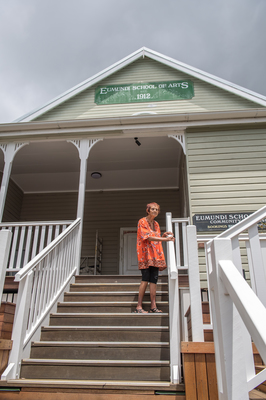When Gubbi Gubbi and Gungulu woman Associate Professor Eve Fesl talks about her life it’s a voice born of experience, determination, and a certain amusement at life’s ironies.
In her quietly spoken but direct manner Eve discusses her life through a series of stories that hint her success is as much a result of coincidence and luck as her fighting spirit.
Eve was a champion athlete, the first indigenous person to attain a PhD from an Australian university and was awarded an Order of Australia Medal for her services to language and work with ethnic communities.
While her mother and many in her family grew up on the banks of the Mary River the government removed her family from their land to the Barambah Aboriginal Reserve, now called Cherbourg, where Eve grew up.
“Under the Aboriginal Protection Act Aboriginal people were rounded up all round the country into camps, concentration camps”, she said.
“They made all the women be called Aunty and the blokes Uncle.”
Eve’s earliest lessons were taught by her mother.
In the education system she was only taught to basic levels.
On the advice of a young English man Eve’s mum decided to take her and her brother to Brisbane, at first for just a visit.
Having heard stories of ghosts at the camp, Eve and her brother’s fears were realised when they caught a tram.
“The first stop was OK, the second stop we started screaming,” Eve said. “We tried to get out of the windows. We saw ghosts. Two nuns had got on, in robes.
“Mum said, that’s it, you’re going to school.”
They moved to Brisbane and Eve attended Ashgrove State School where she soon discovered racism and worked out her own way to deal with it.
“There was this girl, Nancy. I brought out a banana and she said ‘do dirty little black girls eat bananas like that’. I was upset,” she said. “Nancy was the school’s running champion. I trained and trained and beat Nancy. I said, ‘can’t you even beat a dirty little blackfeller?'”
Like her beginnings in athletics Eve’s entry into discus was by chance. During club sports one day the discus team needed someone to make up the numbers so she volunteered.
“How do you do it,” she asked. “You just turn around and let it go,” she was told. “I almost hit a woman. She ran screaming from the field. The coach said I’ll train you.”
In 1956 Eve was chosen to train for the Olympics in discus Rome.
She learnt German thinking she could get a job in Europe after the Olympics. It was decided there would be no discus in the Rome Olympics.
But Eve excelled in German and it was suggested she sit her High School Certificate (HSC).
“I said I failed English in primary school,” she said but she undertook the HSC regardless and topped the state in German but failed English. She went to night school and in the next HSC “managed to scrape through in English”.
Her high German score gained Eve a place at Melbourne’s Monash University where she studied linguistics.
It was partly because of her German she met her husband. She’d gone for a run along the beach with a training friend one morning when they ran into two men. One, a German, later contacted her and they remain married.
Eve continued her studies, earned an honours degree in anthropology and a graduate diploma in international law before completing her PhD in 1989.
“I was concerned Aboriginal language was not being recorded properly,” she said. She worked with her mother, a fluent Gubbi Gubbi speaker, to document the language.
Over the years Eve’s academic positions have included Associate Professor in the Faculty of Education and Convenor of Murri Programs on the four campuses of Griffith University, and the Director and Associate Professor in Koorie Studies of the Koorie Research Centre at Monash University as well as lecturer in the Oodgeroo Unit at the centre Queensland University of Technology. Eve has also been a member of a number of national bodies including the Advisory Council on Multicultural Affairs, the National Museum of Australia’s Aboriginal Advisory Committee, the Aboriginal Literature Board and the Aboriginal Arts Board of the Australia Council. In 1993 she published a political history of the invasion and settlement of Australia from the Aboriginal point of view called Conned.
Gubbi Gubbi country in south-east Queensland extends from the north bank of the Pine River, up the Sunshine Coast to the Isis River and is hemmed in on the west by the Conondale Ranges.
In addition to her affinity for language Eve has a love of country which has led her to lend her voice to several conservation issues including the prevention of damming the Mary River and in Nunawading, Victoria it ended in her election as a local councillor.
“I helped conservation to stop a freeway in Nunawading,” she said. “They were nominating people for council election. They said how about you Eve – you won’t be elected. I ended up being a councillor.”
Eve is a small woman but she cuts a dignified figure and speaks with measured sentences.
A serious bout of pneumonia recently left the 86 year old in intensive care but now she is recovering and continuing with her fight to right injustice where she sees it.
“When I think of my mum and my grandma and my uncles, how they were treated. Mum and the rest just accepted things and adjusted to things,” she said.
“For them, it was much better to be that way than to be angry and hurt. I used to get angry that they accepted this, because I’m a fighter. A fighter in a polite way, I think.”
The word has always been mightier than the sword for Eve and much of her legacy has been through her work in language.
She has been working to set up a language program that is operating in NSW to teach Aboriginal language in school.Even at the medical centre she visits she has passed on her knowledge and everyone has learnt to greet her with “Wunya” which in Gubbi Gubbi is both a hello and farewell.
The United Nations has declared 2019 the international year of indigenous languages. In Noosa, the home of the Gubbi Gubbi people there are many indigenous words that could be adopted into the general vocabulary just like this greeting. Wunya.











